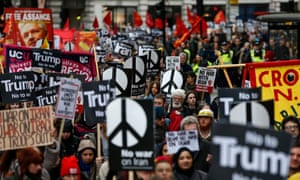
Non-violent groups on UK counter-terror list threaten legal action
Posted: 23rd January 2020
This article from the Guardian explains the latest position in this strange saga
Non-violent groups on UK counter-terror list threaten legal action
Animal Aid, CND and Extinction Rebellion among those saying rights violated
Vikram Dodd and Jamie Grierson
Wed 22 Jan 2020 19.43 GMTFirst published on Wed 22 Jan 2020 14.29 GMT

Peaceful protest groups listed in a counter-terrorism guide used as part of anti-extremism briefings are threatening legal action unless it is withdrawn.
The Guardian revealed on Friday that Greenpeace, Peta and other non-violent groups were listed alongside neo-Nazis in the document used as part of training for Prevent, the anti-radicalisation scheme designed to catch those at risk of committing terrorist violence.
The guide, from June 2019, bears the logo “Counter Terrorism Policing” on every page, and was presented in briefings to public sector workers such as medical staff and teachers. Police said the document was provided to Prevent partners as “a guide to help them identify and understand the range of organisations they might come across”.
The groups behind the legal threat include Animal Aid, Palestine Solidarity Campaign, the Campaign for Nuclear Disarmament, and Extinction Rebellion.
The letter sent by solicitors acting for the groups says: “Our clients are non-violent organisations focused on lawful protest and engagement to pursue their legitimate aims.
“Their inclusion in a Counter Terrorism Policing document, and the inference that they are involved in unlawful activities, and the targeting of their members and/or activists for referral … plainly amount to an unlawful interference with the rights of their members and/or activists.”
Police so far have stood by their actions. “Our focus is definitely not on lawful protest, or legitimate causes taken up by activists across the country,” Counter Terrorism Policing’s senior national coordinator, deputy assistant commissioner Dean Haydon, said last week.
A fortnight ago, police said they were recalling a separate document that listed Extinction Rebellion (XR), the climate emergency activist group, as extremist alongside banned far-right groups and an Islamist group linked to violence.
On Wednesday, the security minister told parliament the government does not consider Extinction Rebellion to be an extremist organisation.
Brandon Lewis was forced to clarify the government’s stance on XR and a wide range of non-violent protest groups in response to an urgent question tabled in the House of Commons.
Diane Abbott, the shadow home secretary, who was granted the urgent question, said the move to list XR was a “very serious error of judgment”, while the Conservative MP and former secretary of state, David Davis, accused the agencies of acting like “thought police”.
Lewis said: “Counter-terrorism policing in this country is operationally independent. This is an important principle. The operational independence of our police from government is integral to our democracy.
“The Home Office does, however, carry oversight of the police on behalf of the home secretary. We are clear that the right to peaceful protest is a cornerstone of our just society and an indispensable channel of political and social expression.
“Counter-terrorism policing South-East have for example stated categorically that they do not classify Extinction Rebellion as an extremist organisation and the inclusion of Extinction Rebellion in their guidance to frontline officers was an error of judgment. The police have recalled the guidance and are reviewing it.
“I want to reiterate that Extinction Rebellion is in no way considered an extremist group under the 2015 definition of extremism and the home secretary has been clear on this point.”
The government’s counter-extremism strategy, published in 2015, defined extremism as the “vocal or active opposition to our shared values. These include democracy and the rule of law, mutual respect and tolerance of other faiths and beliefs. We also consider calling for the death of our armed forces either in the UK or overseas to be extremism.”
Both anti-terror documents revealed by the Guardian encouraged anyone with concerns identified by the content to consider a referral to Prevent or report suspicious activity through the Action Counter Terrorism anonymous online form.
Abbott said: “He (Lewis) is telling the house now it was an error of judgment but on this side of the house we would argue it was a very serious error of judgment.”
She added: “In a democracy there is a fundamental right to disagreement and non-violent campaigning and interfering or denying that right even in terms of an error of judgment is a fundamental breach of the democratic contract between the government and the governed.